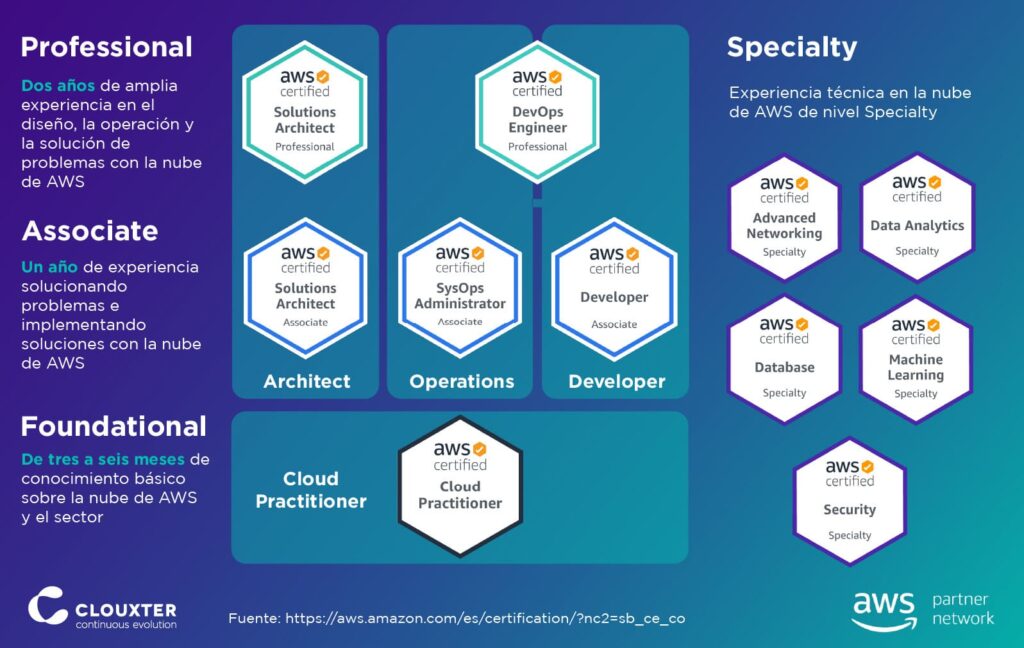Amazon Web Services (AWS) certifications certify your knowledge in the cloud and are recognized by the technology industry. Each credential helps you highlight your AWS cloud skills and knowledge.
What are AWS certifications?
Amazon Web Services (AWS) certifications certify your knowledge in the cloud and are recognized by the technology industry. Each credential helps you highlight your AWS cloud skills. There are various certification exams by role and specialty, which are tied to you achieving your objectives.
So, the first question you should ask yourself is if you have already defined these objectives. If not, don’t worry, we will help you clarify this path so that you can be a pillar in the digital transformation of your business.
Why get certified in the AWS cloud?
- According to AWS data, they predict a 28% increase in the number of jobs requiring cloud skills over the next five years. Therefore, job opportunities are increasing.*1
- 91% of organizations with AWS-certified staff say that having such staff boosts innovation with AWS services. More and more organizations need to be in the cloud and need specialized equipment.*2
- 90% of IT managers who employ AWS-certified staff say productivity improved after their staff earned AWS Certification, while 89% report faster problem resolution. Without a doubt, each certification takes you to a higher level of responsibility and assessment for IT teams. *2
*1 Source: Burning Glass, Skills of Mass Disruption, December 2020.
*2 Source: ESG Research Insights report commissioned by AWS, Understanding the Value of AWS Certifications to Organizations, 2020.
AWS Cloud Certification Path
As of April 2021, Amazon Web Services offers 11 individual certifications, distributed across four different levels: Foundational, Associate, Professional, and Specialty.

Foundation-Level
AWS Cloud Practitioner: It is one of the basic AWS certifications where you do not need to have previous experience to obtain it. This certification evaluates the basic architectural foundations of AWS, AWS Services, Security, and Compliance. It is an overview of how the cloud works without delving into any particular service. If you want to go deeper, visit: https://aws.amazon.com/es/certification/certified-cloud-practitioner/
Associate-Level
- AWS Certified Solutions Architect – Associate
- AWS Certified Developer – Associate
- AWS Certified SysOps Administrator – Associate
It is recommended that for this level of certification, you have a minimum of one year’s experience, working in the AWS cloud, solving problems, and implementing solutions. Skills are evaluated such as functionality of AWS-based applications, creation of secure applications on the platform, implementation of hybrid systems, practical application design, application development, secure environments, etc.
- AWS Certified Solutions Architect: You must have hands-on experience designing available, cost-effective, fault-tolerant, and scalable distributed systems on AWS. Manage Identity and Access Management (IAM), Virtual Private Cloud (VPC), S3 and EC2. AWS specifies that this certification validates the ability to design and implement distributed systems in its cloud.
- AWS Certified Developer: delves into services like Dynamo DB, Elastic Beanstalk, SQS and SNS, Earning the AWS Certified Developer – Associate certification validates the ability to write and deploy cloud-based applications. Greater understanding is expected about how you would use these services, as well as presenting them to the outside world through APIs and SDKs. Topics such as data persistence and CRUD operations with DynamoDB in the Alexa SDK.
- AWS Certified SysOps Administrator – Goes quite deep into CloudWatch. By having this certification for AWS you demonstrate experience in deploying, managing, and operating workloads on AWS. This certification is considered the most complex at the associate level. However, if your goal is to become certified at the professional level, it is essential that you first earn associate-level badges to ensure a successful learning curve.
Level – Professional
- AWS Certified Solutions Architect – Professional
- AWS Certified DevOps Engineer – Professional
It is recommended to have at least 2 years of comprehensive experience using the AWS cloud, with extensive experience in design, operation, and troubleshooting. These certifications evaluate skills such as the implementation of complex migrations, cost optimization strategies, infrastructure and application implementations in the cloud, monitoring, and registration of AWS systems, and implementation of scalable systems on AWS.
If you have mastered the AWS Associate Level certifications, this is the next step to overcome. These certifications represent the highest level of knowledge for Amazon Web Services as they are broad in scope and deep in focus.
- AWS Certified Solutions Architect – Professional: You must be equipped to take any AWS feature or service and put it to good use. Amazon specifies that this certification validates the ability to design, deploy, and test applications on AWS under different and complex requirements. For Solutions Architect – Pro, every service across the entire AWS ecosystem is up for grabs, and some depth is required in specific areas like Security and Direct Connect.
- AWS Certified DevOps Engineer – Professional: DevOps is about combining development, operations, and a quality mindset to guide systems over time. This exam requires you to think not just about static systems that are implemented once, but about systems that change and evolve over time. This certification delves into specific areas like deployments and lifecycles (and services like CloudFormation and OpsWorks). By becoming certified you validate your ability to automate testing and deployment of AWS infrastructure and applications.
Level – Specialized Certifications
- AWS Certified Advanced Networking – Specialty
- AWS Certified Data Analytics – Specialty
- AWS Certified Database – Specialty
- AWS Certified Machine Learning – Specialty
- AWS Certified Security – Specialty
Take this path if you already have technical and practical experience in the AWS cloud, if you feel ready, then it is undoubtedly the next step in your professional career. AWS specialty certifications delve into narrow focus areas, specifically networking, data analytics, databases, security, and machine learning. Like professional-level certificates, they should not be approached lightly, and several years of practical professional experience in each specialty domain is recommended.
Advanced Networking-Specialty
By obtaining this specialty, Amazon validates your experience in designing and maintaining network architecture for a wide range of AWS services. If you already have more than 5 years of experience in the AWS cloud, you might already be thinking about taking this accreditation. Among the recommendations that Amazon gives before taking this exam, they explain that:
- Must have knowledge of advanced network architectures and interconnectivity options, for example: IP VPN, Multiprotocol Label Switching (MPLS), Virtual Private LAN Service (VPLS)
- Familiarity with script development and automation tools.
- Knowledge of CIDR and subnets (IPv4 and IPv6); IPv6 transition challenge; and generic solutions for network security features
Data Analytics-Specialty
This specialty validates experience using AWS Data Lakes and analytics services to derive insights from data. If you work with AWS services to design, build, secure, and maintain analytics solutions, you might consider earning this badge. Among AWS’s recommendations for acquiring this badge they include:
- Have five years of experience with common data analysis technologies.
- Two years of practical experience.
- Ability to define AWS data analytics services and understand how they integrate.
- Ability to explain how AWS data analytics services fit into the data lifecycle of collecting, storing, processing, and displaying data.
Database-Specialty
This certification, one of the most recent from Amazon Web Services, demonstrates that you can recommend, design, and maintain AWS database solutions for the unique database services needs of organizations. You are expected to understand database implementation, migration, administration, monitoring and troubleshooting; workload-specific database design; and database security. AWS recommends:
- Have five years of experience with common database technologies
- Two years of hands-on experience with AWS and experience working with on-premises and cloud-based NoSQL and relational databases.
Machine Learning-Specialty
This badge is one of the newest and focuses on Machine Learning. This specialty validates experience in building, training, tuning, and deploying Machine Learning (ML) models on AWS. Before taking the certification AWS recommends:
- Have an understanding of the underlying concepts of Machine Learning
- At least two years of hands-on experience developing, architecting, and running Machine Learning workloads in the AWS cloud, as well as collecting and analyzing data, modeling, and algorithms
- Proficient in Kinesis for streaming data collection and SageMaker for creation, training, tuning, and deployment.
Security-Specialty
If you are in a security role and have at least 2 years of hands-on experience protecting AWS workloads, you may consider preparing to earn this AWS badge. It delves into several security-specific services, such as Identity and Access Management (IAM), Virtual Private Cloud (VPC), Key Management Service (KMS), CloudTrail, AWS Config, and Web Application Firewall (WAF). Some of the most common questions in this exam allow you to find out how different security settings interact or conflict. Additionally AWS also recommends:
- Have a minimum of five years of experience in IT security.
- Have a minimum of five years of experience related to the design and implementation of security solutions.
If you reached the end of this article it is because you are interested in strengthening your expertise in the AWS cloud and being recognized by the technology sector to continue scaling as much as you can. In total you have 11 certifications distributed across multiple levels and discipline areas, it all depends on your professional needs. If you want to know more details about AWS training and certifications you can visit: https://aws.amazon.com/es/training/
